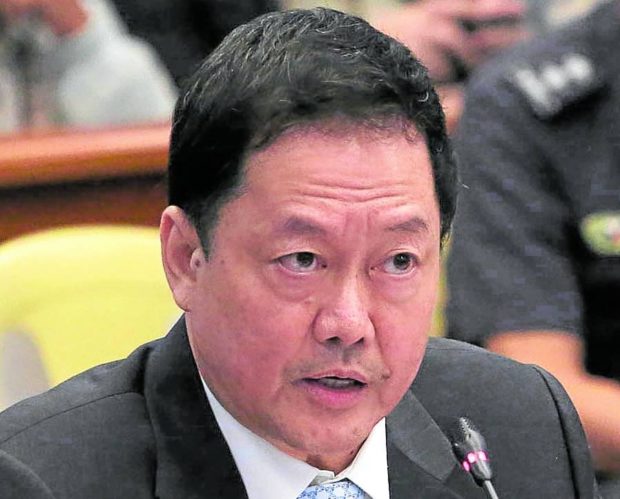
Solicitor General Menardo Guevarra. (FILE PHOTO)
MANILA, Philippines — The government has formally asked the International Criminal Court (ICC) to reverse its decision to reopen the investigation into the killings committed under the Duterte administration’s anti-drug campaign.
In an appeals brief filed on March 13, the Office of the Solicitor General (OSG) asked the ICC Appeals Chamber to suspend and reverse the ruling that authorized the reopening of the investigation by the ICC prosecutor.
“The Philippine Government respectfully requests that the Appeals Chamber grant suspensive effect pending resolution of this appeal, reverse the ‘authorization pursuant to Article 18 (2) of the Statute to resume the investigation,’ and determine that the Prosecution is not authorized to resume its investigations in the situation in the Republic of the Philippines,” it read.
The government said the ICC Prosecutor “would lack any legal foundation” and his investigation “would encroach on the Philippines’ sovereignty.”
‘Irreversible situation’
The Philippines argued that if the ICC would proceed without jurisdictional basis, “its mandate would be adversely affected due to the implications such acts would have for those affected by the Court’s operations, in particular suspects, witnesses and victims.”
“The resumption of the Prosecution’s investigation pending resolution of this appeal would therefore defeat its very purpose and create an irreversible situation that could not be corrected. The suspension of the Prosecution’s investigation into the Situation in the Republic of the Philippines is therefore warranted pending the expeditious resolution of this appeal,” it added. The government reiterated its argument that the Philippines had withdrawn from the Rome Statute, the 1998 treaty that established the ICC, insisting that the Hague-based court has no jurisdiction over the country.
But while seeking to stop the investigation, the OSG said “the Philippine government remains committed to the goals of the Court…”
It stressed that “the Philippine Government has openly recognized its responsibility to investigate and prosecute crimes which occurred in connection to the anti-illegal drugs campaign and continued to willingly engage with the Court following its withdrawal which took effect on 17 March 2019.”
PH probes under way
The OSG also said that the government has also previously informed the ICC that “it is investigating or has investigated its nationals or others within its jurisdiction with respect to the alleged crimes against humanity of murder under Article 7(1)(a) of the Statute committed throughout the Philippines between 1 July 2016 and 16 March 2019 in the context of the so-called ‘war on drugs’ campaign, as well as in the Davao area between 1 November 2011 and 30 June 2016.”
But it lamented that the government’s “efforts were not fully credited and its offer to maintain cooperation was unreasonably cut short.”
Government data put the death toll of the drug war during the term of former President Rodrigo Duterte at 6,252.
Human rights groups, however, contend that the actual number may be thrice that figure due to sloppy case documentation and police investigation, including the falsification of death certificates.
Khan can respond
The filing of the government appeal brief came after the ICC Pre-Trial Chamber (PTC) I, in a Jan. 26 decision, authorized ICC prosecutor Karim Khan to proceed with the preliminary investigation.
In a Feb. 3 notice of appeal, the government, through Solicitor General Menardo Guevarra, who served as Duterte’s justice secretary, sought the reversal of the ICC chamber’s decision.
The appeal brief contained the government’s detailed arguments.
Under ICC processes, the prosecutor is given the chance to respond after the submission of the appeal brief.
The Marcos administration has supported its predecessor’s position on the ICC case, arguing that the court has no jurisdiction over the Philippines after the country’s withdrawal from the Rome Statute took effect in 2019, and that the government is already investigating the same drug war-related cases under scrutiny.
In 2021, the Supreme Court ruled that withdrawing from the Rome Statute “does not discharge a state party from the obligations it has incurred as a member.”
Four grounds
In its appeal, the government cited four “grounds” for the reversal of the ICC decision to reopen the probe.
First, it said, the PTC erred “in law in finding that the Court could exercise its jurisdiction on the basis that the Philippines was a State party ‘at the time of the alleged crimes’ and that the ‘ensuing obligations’ of the Rome Statute remain applicable notwithstanding the Philippines withdrawal from the Statute.”
Second, the PTC made an error in reversing the prosecution’s burden of proof, it added. “As the moving party, the Prosecution bore the burden of proof to establish that the deferral request was not genuine in order for it to resume its investigations. The failure to apply the burden of proof on the proper party vitiates the entire analysis in the Impugned Decision.”
Third, the chamber “erroneously relied on the admissibility test for a concrete case”; and fourth, it also “erred in its failure to consider all Article 17 factors.”
Article 17
According to the OSG, the situation in the country was inadmissible under Article 17 of the Rome Statute.
The article states that the court can declare a case to be inadmissible when it “is being investigated or prosecuted by a State which has jurisdiction over it, unless the State is unwilling or unable to genuinely carry out the investigation or prosecution.”
Under the same article, the tribunal can also rule that there is “unwillingness” on the part of the concerned state if the “proceedings were or are being undertaken or the national decision was made for the purpose of shielding the person concerned from criminal responsibility for crimes.”
The ICC will also consider whether, due to a total or substantial collapse of a country’s judicial system, it is unable to obtain the accused party or the necessary evidence and testimony against him, or otherwise “unable to carry out its proceedings,” the government added.

